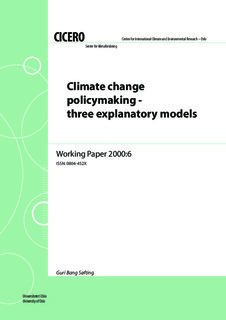| dc.description.abstract | This paper gives an outline of three explanatory approaches to policymaking processes that allow the development of a rich set of non-trivial, probable assumptions. These assumptions provide a foundation for understanding climate policymaking behavior. First, the Unitary Rational Actor model provides a set of assumptions about the state’s interest in calculating costs and benefits as a basis for decision-making. By avoiding the inclusion of sub-actors in the analysis, it is possible to analyze behavior while assuming that the actor is unitary and in full control of the situation. Second, the Domestic Politics model presents a set of assumptions where domestic actors have different sets of preferences, and where the internal distribution of costs and benefits between them is crucial for decisions on climate policy strategies. And third, by applying the Social Learning model, the assumption is that the learning processes climate policy actors are involved in are able to change their interests and preferences as the policy process unfolds. The concern is not only with analyzing policy formulation patterns as a material calculus to maximize self-interest, but also with taking into account action as a result of social norms and the social environment. The development of climate change policy in Germany is used as an illustrative example throughout the paper. | nb_NO |
